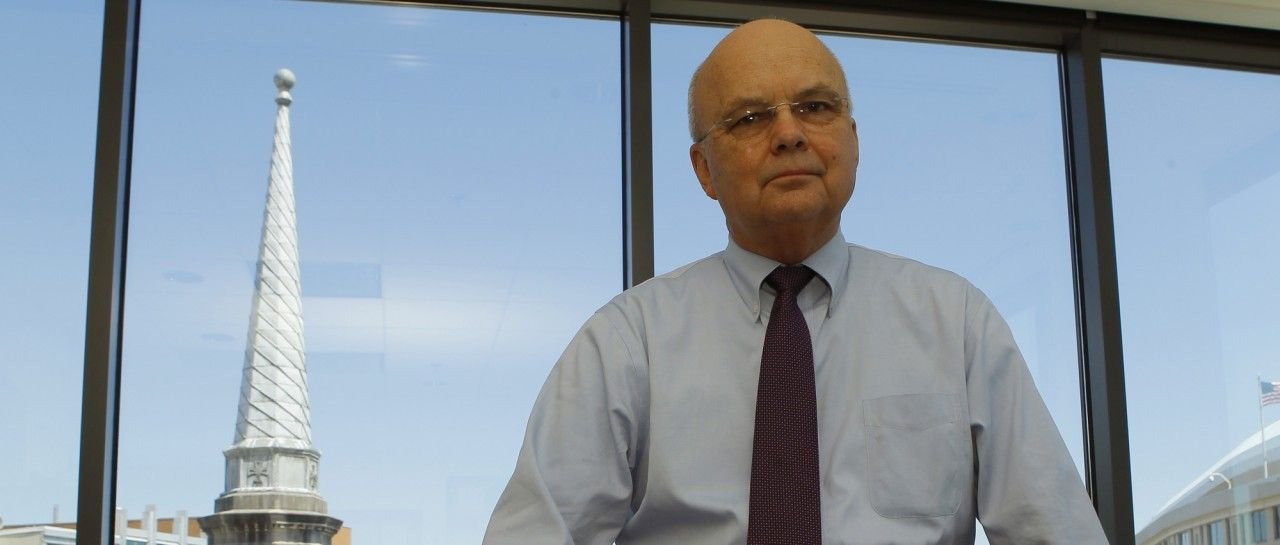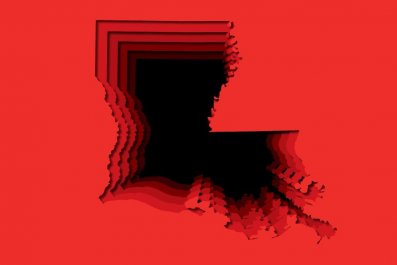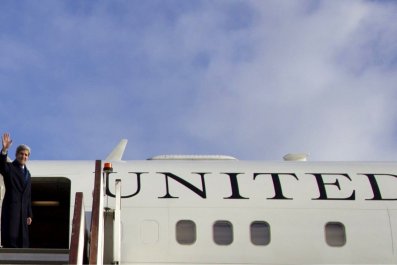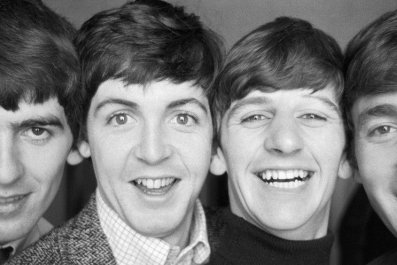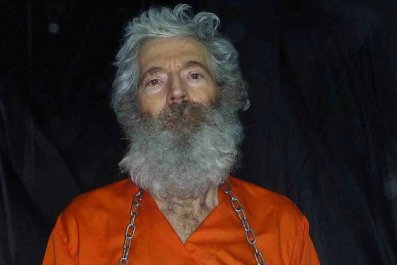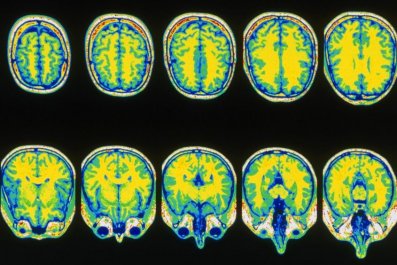First off, I say, let's get that Amtrak thing straightened out.
Michael Hayden chuckles. The former eavesdropper-in-chief totally gets the irony of having someone secretly listening in on his phone conversation during a train trip to New York last October. Even more delicious was the revelation that the person eavesdropping on him was Tom Matzzie, former director of the Washington office of MoveOn.org, the left-leaning political group that is a decrier of all things NSA.
Matzzie live-tweeted Hayden's "on background" conversation with a reporter, in which he included a few "disparaging quotes" about President Obama.
"I wasn't trashing him - that was misreporting!" says Hayden. "Let me tell you what I talked about. I'd been asked about Angela Merkel," whose cell phone conversations the NSA had listened in on, according to über-leaker Edward Snowden. "And I said, 'Hey, look...when the president was elected, when he was president-elect, he was fixated with his BlackBerry, and we said, 'No, Mr. President. You can't use that.' And he said, 'Well, I am going to use that.' And we said, 'Well, all right, fine, give it to us for a few days, and we'll fool around with it and give it back to you."
And "the backstory of that," Hayden adds, "is the security establishment is telling the soon-to-be-most-powerful man in the world in the most powerful country on Earth, that if he chooses to use his Blackberry in the national capital, a whole bunch of foreign intelligence services are going to be reading his email and listening to his phone. And that's what I said."
And the backstory to that backstory, of course, is that everybody does it - everybody spies on everybody all the damn time - if they can.
Matzzie "took it to be bashing the Obama administration," Hayden says. "And that was the only thing I said. I mean, the guy was the political director of MoveOn.org."
Hayden chuckles again.
The retired Air Force general, a former chief of both the CIA and NSA, seems to be everywhere these days - giving speeches and interviews, working the Sunday talk shows. There he was again yesterday, on BBC TV, explaining the recommendation of a White House panel to curtail NSA spying programs.
So very un-spook-like.
For a lifetime intelligence officer, he's pretty talkative. His immediate predecessors, Porter Goss and George Tenet, are rarely heard from. Tenet, CIA director in the Clinton and first George W. Bush administrations, turns down many requests for interviews and speeches and "hasn't appeared on a Sunday show since 2007," his spokesman Bill Harlow told Newsweek. Even the garrulous Leon Panetta, who replaced Hayden as CIA director in 2009, finally seems to be fading away to a quiet retirement on his California walnut farm after a stint as secretary of defense, among other high-level appointments and a career as a congressman before those.
Only James Woolsey, CIA director for a short while in the Clinton administration, seems to be all over town, yapping about this and that, but his advocacy of the Iraq War and other neoconservative adventures seems to have whittled down his stature.
Is Hayden running for office? Looking for another job in a future administration?
He laughs again. "If I picked up that phone, my wife would cut off my hand!"
What phone? Any phone, he says - any phone bringing a summons from a president to return to government.
"Now, I know I appear to be incredibly youthful," he jokes, "but on my next birthday, I'll be 69. It's time to start enjoying your grandkids - that's what it is."
Hayden does appear comfortable in his expansive corner office in downtown Washington, with big windows overlooking a busy intersection only a few blocks from the White House. Along with other big guns at the Chertoff Group, the consulting firm headed by another all-everything, Michael Chertoff, the former homeland security secretary, he's cashing in and having a ball.
"I'm here about half my time," he says. "I teach at George Mason. I have a bunch of boards and consultancies and a very good speakers bureau.... "
In February, he has a joint speaking gig in Munich with his Israeli counterpart, Maer Dagan, the former head of Mossad. They were so close when Hayden ran the CIA, a well-placed source says, that the Israelis were afforded the unique privilege of bringing cell phones and laptops into the spy agency's headquarters. Nobody but nobody gets to do that.
When asked about this courtesy, Hayden demurs. "I just don't remember it specifically."
"I have no desire to be back in government," Hayden insists. "Miss the mission, miss the people," but those top spy jobs are killers.
The big joy of life today, he says, is that "I get to say what I think."
And he does. One big thing he thinks is that nobody really understands what the NSA is and isn't doing, despite blockbuster revelations going back to 2005, a cascade of legal suits, judges' orders curtailing its practices and the river of data and charts channeled through the media over the past six months by former NSA contractor Edward Snowden.
It's just too complicated, he argues, to boil down. It's a huge problem. Members of the intelligence committee had a hard time getting a grip on it too, he says, when he was NSA director.
"To be fair, though, this is obscure stuff. I mean, I'd be up there [in a hearing] - and I'm pretty good at this stuff - I'd be explaining things for 30 or 40 minutes, with my introduction, and slides and maps and so on, and then I say, 'I'm ready for your first question.' And it was clear to me they didn't understand a word that I'd said. Not to be judgmental, it's just that this is very obscure."
As he has said ad nauseum, NSA is not targeting Americans! Nobody gets that, he says, starting with reporters!
"I have people in your profession calling me up about the Snowden revelations saying, 'What does this mean, what does that mean?' I'd say, 'That's not incidental collection, that's inadvertent collection - a different thing altogether.' And it's, 'What-the-hell?' And you've got to walk them through it."
He offers a more concrete example. Stories that say NSA is targeting Americans' emails are "technically correct, and a lie at the same time. I mean, what you're talking about is foreign intelligence collection - I'm generalizing here, but I'm just trying to give you an example - you've got foreign intelligence collection, you're collecting against a foreign intelligence target. If the foreign target is in communication with a 'protected' person, a U.S. citizen - well, game on, that's been permitted since 1952, you can cover the target. And then you have to minimize the U.S. identity and so on. So in a sense, yes, quote, including U.S. emails, quote - if I have five minutes, I can explain it on Meet the Press and everyone can go, 'Yes, that kinda makes kinda sense,' but that's five minutes on 'including U.S. emails,' and I lose that [argument], NSA loses that, every time, because it takes too long to explain."
You see the problem? Nobody seems to know what the hell they're talking about here, maybe not even Hayden.
One of the NSA's problems, he says, is that Snowden's revelation of massive eavesdropping arrived "in this swirl of fear about government overreach," especially since Obama's election, whipped up by the Tea Party.
Hayden says even he fears "executive overreach." Putting aside the question of whether the government has gone overboard in monitoring the telephone and computer habits and practices of American citizens - not to mention allied presidents and prime ministers - the former NSA chief avers that he, too, is worried about putting in place the tools for a future police state.
He says he warned President Bush about pushing the NSA over the line, reminding him how the agency had been rocked by revelations of illegal domestic spying in the 1970s.
"When I went into see President Bush, when he was authorizing the Terrorist Surveillance Program, I said, 'Mr. President, we need to be very careful here. Since the mid-1970s, my agency has had a permanent one-ball, two-strike count on it.... I actually said that to the president."
Hayden is a man who knows his audience: Bush had been an owner of the Texas Rangers.
"And he said, 'Michael, I understand. But we are going to do this.'"
And, of course, the NSA got caught, first in 2005 by The New York Times, which exposed the so-called warrantless wiretapping program, and then by Snowden.
Obama's counterterrorism policies have been even more muscular than Bush's, Hayden acknowledges. Nevertheless, NSA has been "very cautious about" domestic spying all along, he insists.
But of course, there's a lot of disagreement about that. So the next time you glance up at the television over the bar at your favorite watering hole, you'll likely see Michael Hayden, the happy warrior, trying to explain it all yet again.
"What I'm trying to say is, this is an R-rated movie, this is for adults," he says. "This is how this works."
Jeff Stein is a Newsweek contributing editor in Washington.



